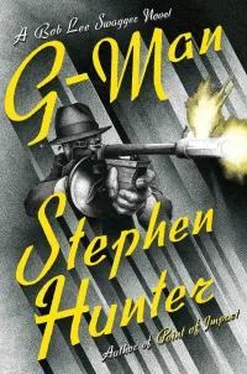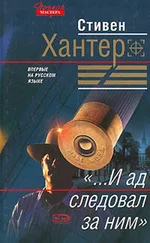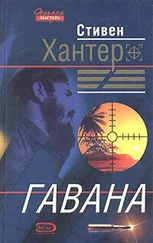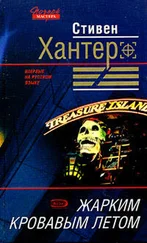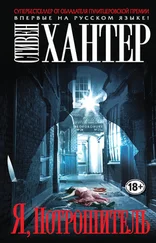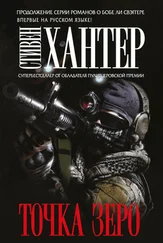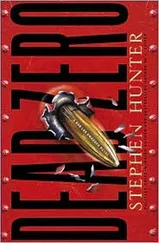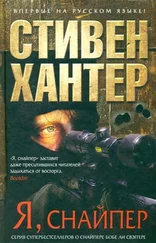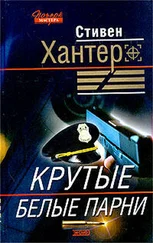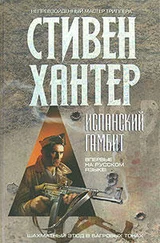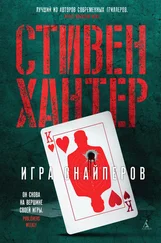Стивен Хантер - G-Man
Здесь есть возможность читать онлайн «Стивен Хантер - G-Man» весь текст электронной книги совершенно бесплатно (целиком полную версию без сокращений). В некоторых случаях можно слушать аудио, скачать через торрент в формате fb2 и присутствует краткое содержание. Жанр: Старинная литература, на английском языке. Описание произведения, (предисловие) а так же отзывы посетителей доступны на портале библиотеки ЛибКат.
- Название:G-Man
- Автор:
- Жанр:
- Год:неизвестен
- ISBN:нет данных
- Рейтинг книги:3 / 5. Голосов: 1
-
Избранное:Добавить в избранное
- Отзывы:
-
Ваша оценка:
- 60
- 1
- 2
- 3
- 4
- 5
G-Man: краткое содержание, описание и аннотация
Предлагаем к чтению аннотацию, описание, краткое содержание или предисловие (зависит от того, что написал сам автор книги «G-Man»). Если вы не нашли необходимую информацию о книге — напишите в комментариях, мы постараемся отыскать её.
G-Man — читать онлайн бесплатно полную книгу (весь текст) целиком
Ниже представлен текст книги, разбитый по страницам. Система сохранения места последней прочитанной страницы, позволяет с удобством читать онлайн бесплатно книгу «G-Man», без необходимости каждый раз заново искать на чём Вы остановились. Поставьте закладку, и сможете в любой момент перейти на страницу, на которой закончили чтение.
Интервал:
Закладка:
From a distance of six inches, alas, the French gun revealed its fraudulence. The rear of the piece, just where it reduced itself in circumference to mate with the barrel proper, didn’t have the same graceful convex of angle as the thing on the desktop.
He looked at it anew and, anew, was struck by the artistry of the thing, the superiority of the metalwork. Guns being pieces of machined metal fitted together, he’d examined those pieces and the way they fit his whole life, and whoever was on the lathe for this one was a master machinist, one of those boys who over a lifetime gets so sublime at his skill, it almost beggars belief. Damn, the boy was good.
He checked his watch. Getting close to dawn in Northern Virginia. He’d gotten nowhere, learned nothing. Where was the big break, the eureka moment?
Like the thing on the desk, it was unknowable.
CHAPTER 30
COMISKEY PARK
CHICAGO
July 24, 1934
Charles had a bad one that night. The war, the usual stuff, the limitless landscape of mud and wire, the faces of slaughtered boys gone away for nothing that ever made any sense, the paleness of their bodies in the ever-falling rain, the delicacy of their faces, if the faces had refrained from being blown off, the hell where youth and laughter go, the silliness of the trinkets of tin and ribbon he’d come home with. He woke, all lathered up in sweat, hungry with rogue impulses about which he could not even think, consumed with self-loathing and a sense of so much Duty undone, so many obligations still owed, the infinite pain of his two sons, the sense of a universe without hope.
At 9 he rose, showered, put on his slacks and a short-sleeved shirt, but left his coat, tie, automatic, and shoulder holster locked in the suitcase under his bed and to his bed. He went downstairs to the diner — he’d forgotten to eat that whole lost Monday — and picked up the Tribune and the Herald-Examiner and ordered some eggs and bacon while he read, at last, what the world was making of the death of John Dillinger.
It bore no resemblance to any world Charles remembered. In this world, the heroic G-Man Melvin Purvis had tracked down and slain the monster almost on his own. Charles had to laugh because it was so extravagantly wrong and yet there it was, the product of the immutable logic of the odd politics of the Chicago Field Office.
Yes, Sam was boss; yes, Hugh Clegg was second in command. But, yes, at the same time, Melvin Purvis was sort of there, and him being extremely handsome, dapper, affable, and pleasant, the press congregated around him, and Charles could only assume that the longer he went on, the more the story became about him and the less it was about the Division of Investigation. If you knew the truth, it wasn’t hard to sniff the myth, but, at the same time, it was hard to hate Melvin Purvis. He wasn’t claiming to be a hero, really, and making immoderate boasts, it’s just that he was there, the reporters knew and liked him, and the easiest way for them to do the job was to put some kind of Melvin shine on everything. It would have taken a man far stronger than Melvin Purvis to turn down the temptation of self-glorification.
Charles almost laughed. He knew the old bastard “bachelor” Director, off in Washington, was in need of a triple bicarbonate of soda this morning. The fellow must be apoplectic. It was exactly what he didn’t want, but at the same time exactly what he couldn’t prevent. What could he do now, fire his “hero”?
“The Man Who Got Dillinger” one paper had headlined under a fine file photo of the dapper Purvis, looking all serious, and the story began, “It came down to a duel of two men, the Man From Crime and the Man From Justice, and, fortunately for all of us, the Man From Justice won.”
Charles had a good time pushing through the nonsense, amazed at just how wrong wrong could be, but at a certain point ran out of newspaper. He needed something to do, something to get his mind off all the politics of the office and the government man-killing trade. He thought of a movie, but that idea wasn’t appealing because of its association with Johnny’s end in Gable’s shadow. Then he remembered that Sam had mentioned a ball game and that appealed to him. He checked the paper, saw that the Cubs, the nineteenth floor’s unofficial mascot team, were on the road, and so he looked and indeed saw there was an American League game at Comiskey Park on the South Side. He knew nothing about the Sox, but that wasn’t the point: losing yourself in the spectacle, the ceremony, the anonymous camaraderie of the stands, erasing the mind and numbing the spirit, that was the point.
Thus, he mounted the El station, which was like climbing into a gigantic iron-girdered monster — maybe an old dreadnought tied up at the dock, with its constellations of iron rivets and stout timbers everywhere, and the smell of the tar with which they sealed off the wood from the elements — caught the southbound train, rocketed through the Loop, and then plunged into loud darkness for twenty minutes as whatever lay between the Loop and Comiskey fled by unseen on the surface.
He emerged in what by lore was called Bronzeville, and the ballpark customers were obvious strangers in this all-Negro world. The two civilizations regarded each other across their great gulf as the fans passed among the residents down 35th Street, approaching the thing ahead, where the ball game would be played. But it was all in good cheer, for the sun was bright, the folks happy, the prospects enticing. The streets were full of hum and buzz, not quite thronged, but still heaped with people, while the park — a castle of brick? a cathedral? — dominated the area, as from all directions citizens approached. All sorts of bright hustle assaulted the newcomers, hot dog stands, fellows selling programs, cotton candy, Cracker Jacks and popcorn, souvenir pennants, little Sox caps, the works. If it was affiliated with baseball and could be sold on the streets approaching Comiskey, it was.
He bought a general grandstand ticket, entered the half-full arena, and got a jolt of pleasure from the green of the field, which dominated the structure, against the red brick of the walls and the quasi-Medieval stylings of the towers and ramparts of the stadium. At half throng, the place was still impressive, as fifteen thousand people of basically one mind and common interest made their presence felt. Charles drifted until he found a nice vantage point of the field, about thirty rows up from the demarcation between box seats and general admissions, a little this side of third base. Really, there wasn’t a bad seat in the place, unless you were stationed behind one of the frequent steel girders that kept it upright, and Charles could see the young men on the field below him, full of life and speed and grace and strength. He made sure not to order a beer, though the whole stadium was generally a giant, circular beer barrel, and everywhere fans were overacting with the elaborate exacerbation of the nearly inebriated. Meanwhile, it was a festival of advertising, as the great American enterprises such as Coca-Cola, Standard Oil, Hamm’s Beer from the Land of Sky Blue Waters, and the Chicago Tribune purchased space on the walls to sell their goods. Pennants and flags spanked the air, the smoke of ten thousand cigarettes and two thousand cigars rose to form a kind of gloriously hazing blur atop it all. It was like a volcano getting ready to blow. Everybody was loud, everybody was happy, everybody wanted to be no other place on earth that particular day, that particular time.
Not much of a game. The enemy team hailed from D.C. — perhaps the Director was a fan — and the Sox, themselves no prize edition this year, handled them pretty easily. The Sox scored in the first inning and never trailed. Swanson, in right, got a couple of hits to lead the team to four runs, and other guys with hits included Appling, Conlon, Simmons, Bonura, and Dykes, for a total of six. A fellow named Les Tietje pitched, lasted until the eighth, and got the win. It all went as it was supposed to go, and Charles took most pleasure from the green of the grass, the white of the uniforms and ball, and the long dramas of interception when someone skied one and it floated through its arc high in the hot, bright sky, then lost energy and began its descent to where it was nabbed in the glove of this or that young fellow, who then uncorked a long trajectory throw that rose a bit, fell a bit, and landed exactly where it had been aimed and was then tossed this way or that at speed, depending on the game situation. There was something soothing in watching the grace of these transactions, and the game, while lacking suspense, also lacked drama or intensity, both of which Charles was glad to leave behind him for a time.
Читать дальшеИнтервал:
Закладка:
Похожие книги на «G-Man»
Представляем Вашему вниманию похожие книги на «G-Man» списком для выбора. Мы отобрали схожую по названию и смыслу литературу в надежде предоставить читателям больше вариантов отыскать новые, интересные, ещё непрочитанные произведения.
Обсуждение, отзывы о книге «G-Man» и просто собственные мнения читателей. Оставьте ваши комментарии, напишите, что Вы думаете о произведении, его смысле или главных героях. Укажите что конкретно понравилось, а что нет, и почему Вы так считаете.
